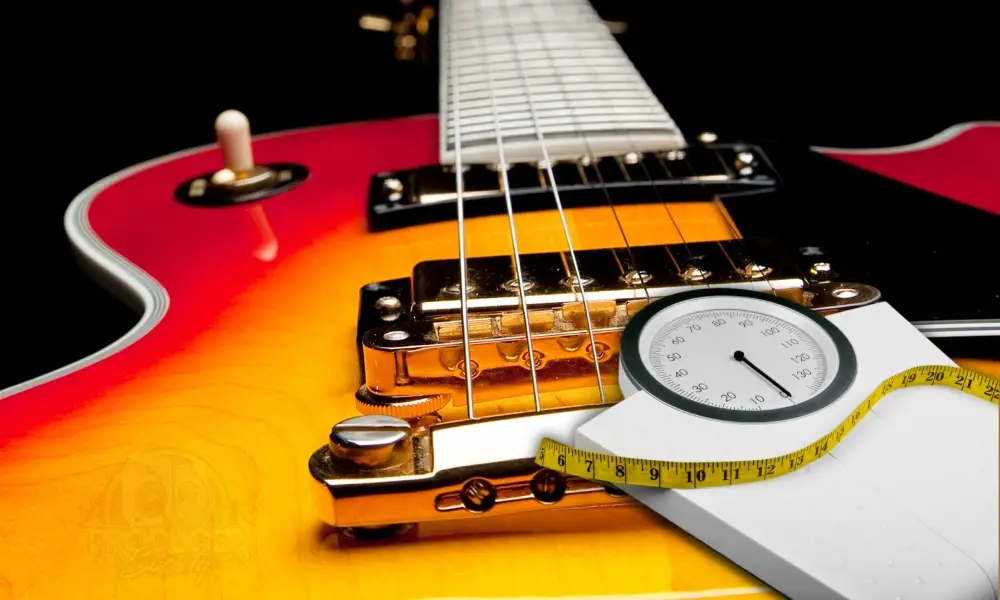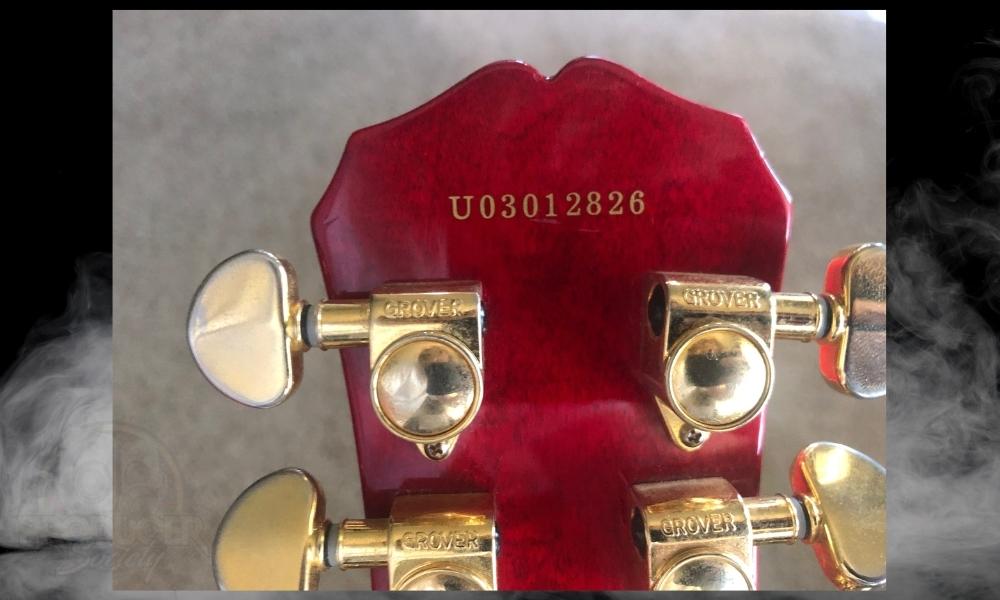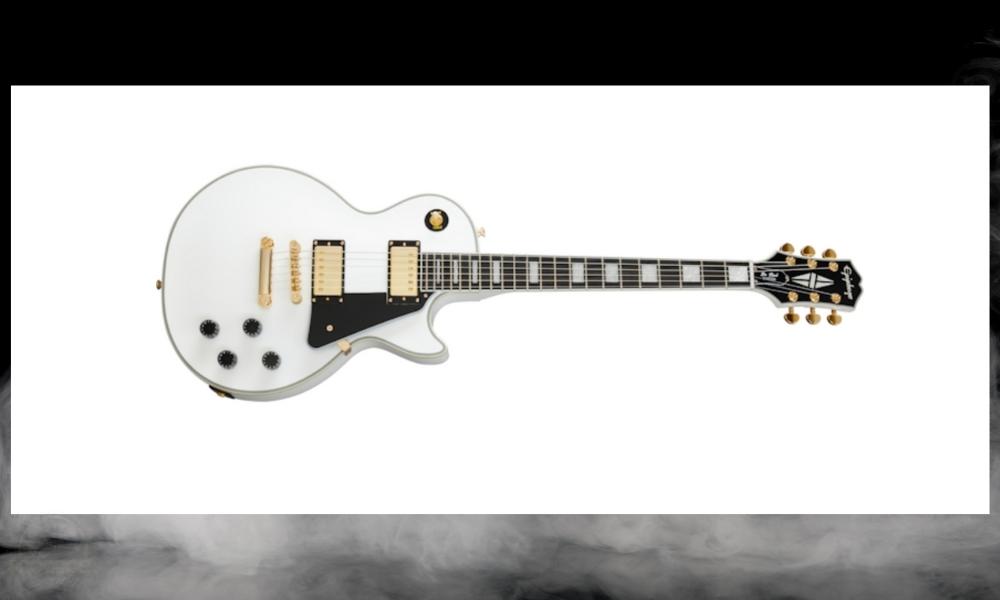Guitarists care about the weight of their equipment because they’re either standing on stage with it or carrying it around from place to place. For that reason, the lighter everything is, the better it’ll probably be for most.
And some guitars are certainly much lighter than others. My Squier Telecaster, ESP Eclipse, PRS SE Custom 24, and my Epiphone Les Paul Custom are all great guitars, but each one is heavier or lighter than the other. The Les Paul Custom is the heaviest.
Typically, Epiphone Les Paul Customs weigh between 9 and 10 pounds, varying based on the specific model and its place and time of manufacture. For instance, those made in Korea before 2004 tend to weigh approximately 10.5 pounds, while their counterparts produced in China average around 9 pounds.
I can’t really speak for all of the Epiphone Les Pauls that have been made, but I can tell you the exact weight of the 2003 Epiphone Les Paul Custom which was manufactured in Korea, and not in China as they are now. In 2004, Epiphone switched up their manufacturing and they no longer rely on the Korean Samick Company.
The Epiphone Les Paul Custom – Korea vs China

As I was saying earlier, there was a time when Epiphone guitars were made in the United States, Japan and then Korea.
For most of Epiphone’s history, they were manufactured in the United States but due to rising costs and competition with lower-cost imitation models, Epiphone had to take their business elsewhere.
According to the Epiphone website, Epiphone made their guitars for a long time in Japan but on account of rising manufacturing expenses, they had to ship their processes over to Korea instead in 1983.
And finally, in 2002 or 2003, Korean production was shut down as well. In 2004, Epiphone opened a new factory in China and they claim that it was the first time the brand had their own dedicated factory since becoming a Gibson subsidiary in 1957.
This brings us to today, where Epiphone Les Pauls are all now made in China with a few exceptions. As with all things guitars, the changes companies make to their instruments, including where they’re manufactured, are always a topic of discussion and debate.
A lot of people online including here, here, and here, wonder if there is a difference in quality between Korean and Chinese-made Epiphone guitars. Some people say there is no difference at all whereas others claim the Korean models were superior.
And this brings me to the weight issue. At one point in time, there was a lot of talk about the increased weight of the Gibson and Epiphone guitars. Some people wholeheartedly believe the weight of your guitar plays a huge role in its sustain and robustness.
Similarly, it’s not uncommon for people to compare Epiphone (Korea) and Epiphone (China), including the design, structure, and weight of each.
Is there a difference between the weight of the Korean-made Epiphone Les Paul Custom and the Chinese model? Let’s take a look at that now.
The Korean Epiphone Les Paul Custom

As you can see from the image above, I’ve got the Epiphone Les Paul Custom with EMG 81/85s in the neck and bridge pick-up (and I’ve still got the original pick-ups in case you’re wondering).
The Korean-made Epiphone Les Paul Custom weighs approximately 10.6 pounds, and I know this to be a fact (I have evidence which I’ll show you in a moment).
You can check out the serial number down here which is the U model (Custom) and the two digits after represent the last numbers of the year it was made, ie, 03 = 2003.

Now, keep in mind that there is an added battery in the back of the guitar because of the EMG pick-ups, so that plays a small role in its weight.
To figure out the weight of the guitar, I had to first weigh myself, and then weigh myself holding the guitar while standing on the scale. That’s how I came to the number.

Ultimately, I think a lot of people wonder whether the weight of the guitar even matters for its sound. From what I can tell, the Epiphone Les Paul Custom is a very heavy guitar, and it does sound a lot different from my lighter guitars.
I have a similarly designed ESP Eclipse which is a much lighter guitar, and it sounds a lot different from the Epiphone Les Paul Custom which tends to have a more full, robust, and rich sound.
I think the best way of describing it is with the word “full-bodied.” It sounds thick, fat, and heavy in the bass frequencies, whereas the ESP Eclipse has more mid-range and treble frequencies.
I recently took a trip back to my parents’ place for the sole purpose of picking up my Epiphone Les Paul Custom. It was the second guitar I ever owned, after a green Yamaha Pacifica, and I missed that characteristic beefy sound.
Regarding the Epiphone Les Paul Custom made after 2003, [Chinese-made], my opinion is a lot less educated so I’ll have to defer to third-party sources on that one.
The Chinese Epiphone Les Paul Custom

According to this website, the Chinese Les Paul Custom weighs 9 pounds, as does the Classic model. This means that the Epiphone Les Paul Custom [Korea] is approximately 1.6 pounds heavier than the post-2003 models made in China.
Something I briefly mentioned earlier is how guitar players love to nerd out. They often argue, debate, and discuss the quality of various vintage models including not only guitars, but pedals, amps, and other effects.
Based on some of the forums and other discussions I’ve seen online, it looks like many people have decided that the Chinese models, more specifically the newer ones, are just as good as the original Korean-made guitars.
Although, people on this forum, for instance, claim there were a couple of years after 2003 where the quality nose-dived, probably just because it was a new manufacturing plant and they probably had new employees as well.
It takes time to refine the process. The guy from Gear-Vault says he prefers the Korean-made models and I have to agree, just because I love my guitar and I think it sounds great.
I’m a big fan of Les Paul shapes though, including my Eclipse which is about one pound heavier.
Other Articles You May Be Interested In
- Batteries in Guitar Pedals vs Power Supply – Which Is Better
- Guitar Effects Loop Vs Direct Input – Which One’s Better?
- How to Use Your Guitar As A MIDI Controller [Full Guide]
- How Long Do 9V Pedals Last in a Guitar Pedal? [Experiment]
- What Are The 12 Main Chords on Guitar? [EASY]
- Is the PRS SE Custom 24 Good For Metal?
Important Things To Note About the Epiphone Les Paul Custom
1) You’ll Have To Buy A Korean-Made Les Paul Custom Used
Because Epiphone no longer makes their guitars in Korea, and hasn’t done so for 20 years, you’ll have to buy either a used model from eBay, Reverb, or some other second-hand retailer or shop.
Luckily for you, there are quite a few of them online so it shouldn’t be a problem at all to find them. From what I can tell, a lot of the Korean-made Epiphone guitars have retained their value. The Japanese-made Epiphones appear to be more valuable as well.


 Written By :
Written By :
